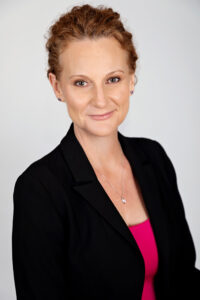Professor Kate Williams is the founding leader of RAMSR. She is a developmental scientist, intervention designer, and evaluator working at the intersection of health and education to address inequities that often arise from early childhood. Kate is recognised as an international expert on social-emotional, self-regulation, executive function, cognitive, and sleep development, and the parenting, educational, and intervention contexts that support such. She began the RAMSR program of work after completing her PhD in 2014, as a way to bring together her research expertise in child self-regulation, and her clinical skills as a Registered Music Therapist. The RAMSR main research study was funded through a prestigious Australian Research Council Discovery Early Career Researcher grant awarded to Kate in 2019. Kate holds a position as Professor of Education at the University of the Sunshine Coast where she is Associate Dean of Research for the School of Education and Tertiary Access, and leads the Education and Learning Futures Research Cluster. Kate is also an Adjunct Professor position at QUT. She chairs the RAMSR Leadership Table, is a RAMSR Master Coach and maintains her passion for building confidence and capability in adults working with young children.
Rebecca Eager is the director of Rhythmic Integrations and one of Australia’s leading Neurologic Music Therapists (NMT). She holds a Master of Music Therapy and advanced fellowship Neurologic Music Therapy training. Over the past 16 years, Rebecca has worked with many and varied families through her private practice specialising in the area of autism (formerly NMTSB – Neurologic Music Therapy Services of Brisbane). Rebecca previously lectured in music therapy at the university level and continues to run professional development workshops and provide professional consultation to colleagues. With a performance musician background, Rebecca created and produced the majority of the music in the RAMSR program. She has been involved in the design and delivery of RAMSR since 2016 and co-designed the RAMSR-T program. Rebecca’s company, Rhythmic Integrations, holds the license to delivery RAMSR professional development.
Dr Sally Savage trained as an early years’ teacher and has had extensive experience in teaching in a variety of early years settings both in Australia and the UK, including kindergartens, long day care, primary school, and home-based early intervention, and most recently, the university sector. Sally has always had a keen interest in singing and has performed in musical theatre, opera and choirs. In 2004-2019, she combined her love of music and teaching, to establish her own music teaching business for children under five and their caregiver. Sally completed her PhD in 2019 with a focus on intergenerational musical mothering. In 2024, she published her first book with Palgrave Macmillan based on her thesis work. Sally was involved in the initial RAMSR pilot study in 2016 and has continued to work as part of the RAMSR team in redesigning the program, designing the new RAMSR-T program, and providing workshops around Australia. Sally currently works as an academic at QUT teaching pre-service teachers, and as QUT Academic Lead and Master coach in RAMSR.
Cathy Nielson is an experienced Project Manager and Senior Research Assistant with a history working in project administration, operations, research, teaching, and leadership. Cathy has a background in Early Childhood Education and Teaching with her most recent experience centering around policy and procedure development, quality systems, team organisation, data analysis, process design, and branding. With a strong understanding of early intervention and prevention strategies focused on early childhood, Cathy uses this knowledge to support the RAMSR team, specifically contributing early childhood perspectives on teacher training.
Dr Laura Bentley completed her PhD on evaluating the RAMSR program, previously having completed her undergraduate degree in Psychological Science (Hons) at the University of Queensland. During her PhD candidateship, Laura has thoroughly enjoyed learning more about the benefits of rhythm and movement for young children’s development and feels very honoured to have had the opportunity to contribute to the evidence-base supporting RAMSR. As part of her project, Laura evaluated the sustained program effects 6 months after children had received RAMSR and as they transitioned into their first year of school. She also interviewed a range of early childhood professionals to gain better understandings of the facilitators and barriers for implementing RAMSR. Laura is now working as a post-doctoral research fellow at the University of Queensland, exploring outcomes of early detection of musculoskeletal complications in children with Cerebral Palsy. Laura continues her work in supporting positive chid development and is still keenly involved RAMSR as part of the leadership table.




